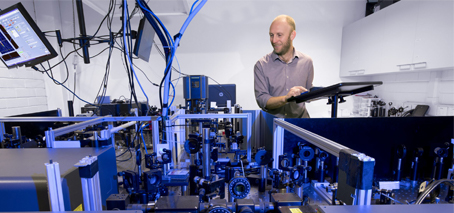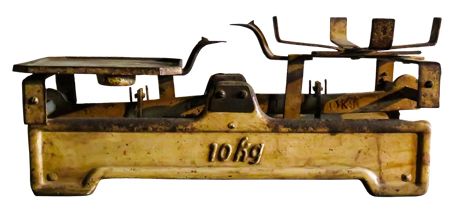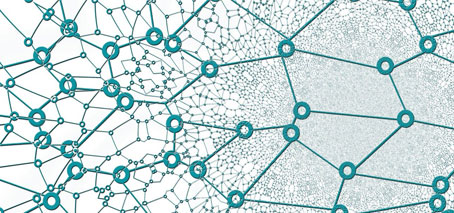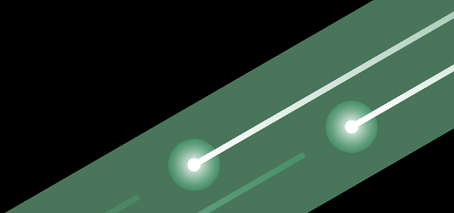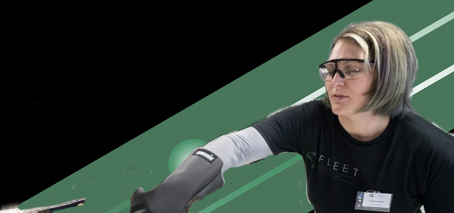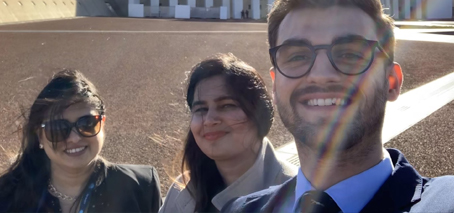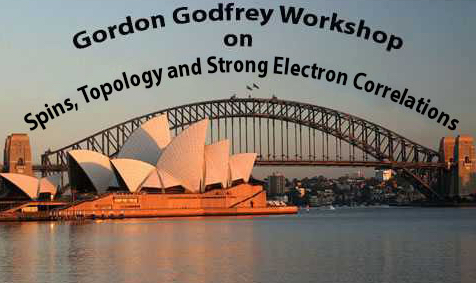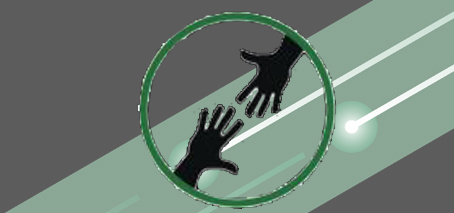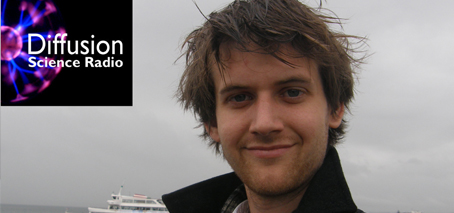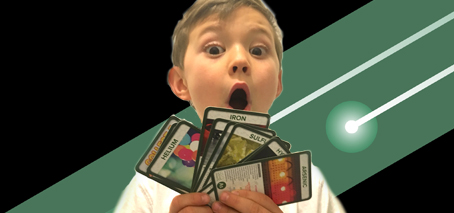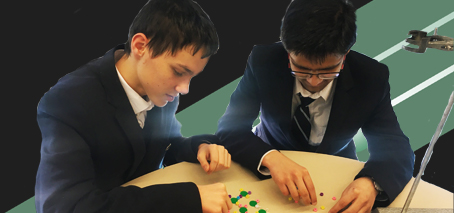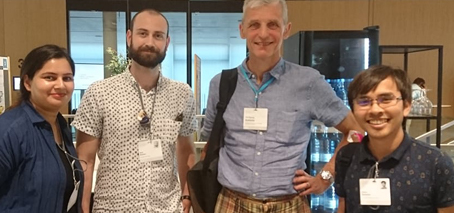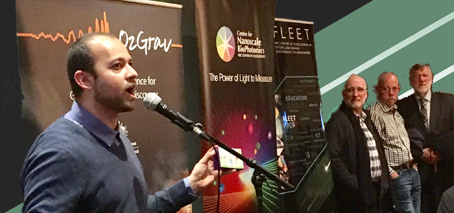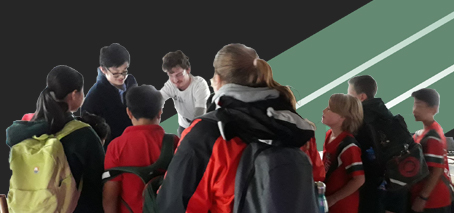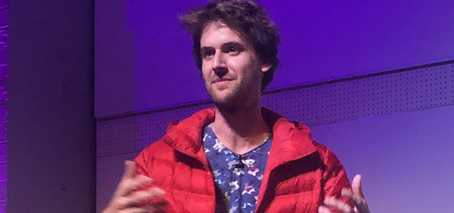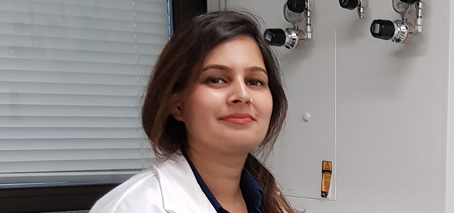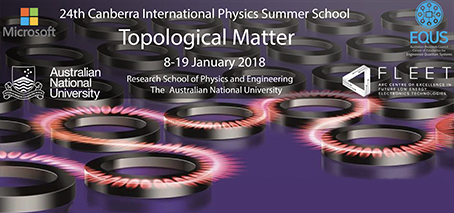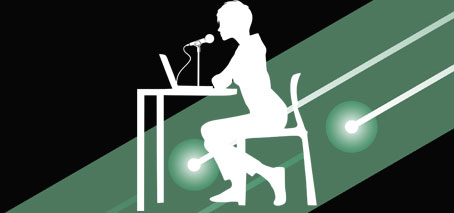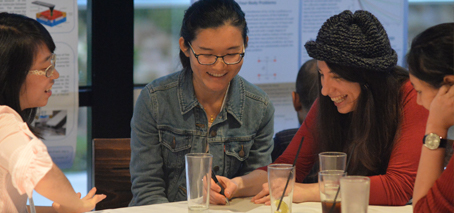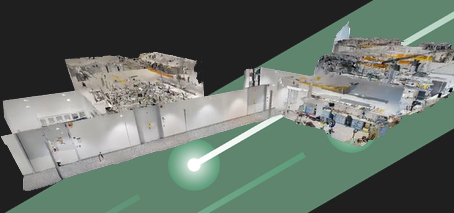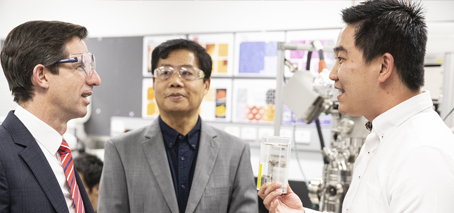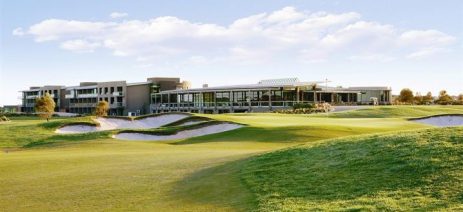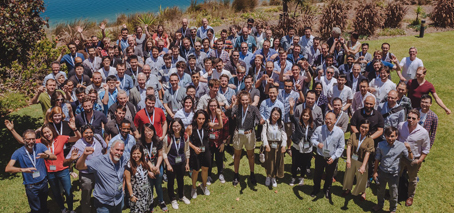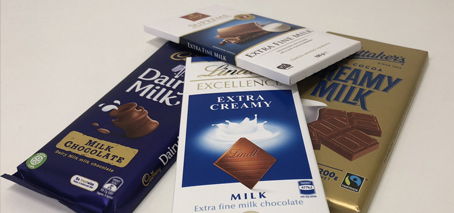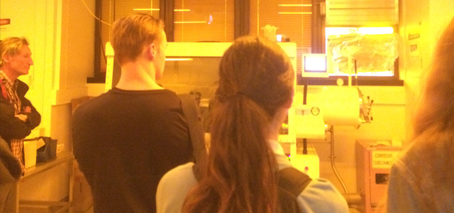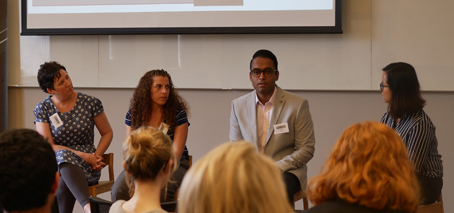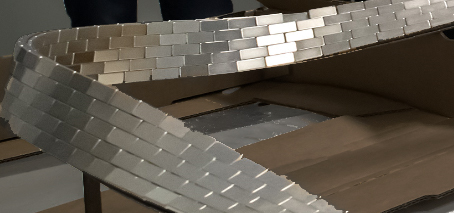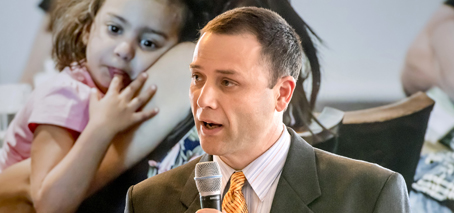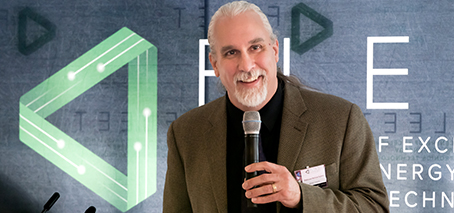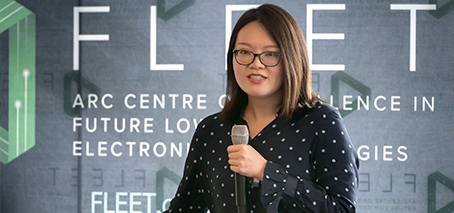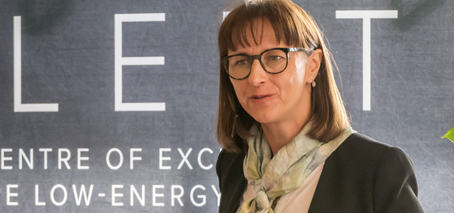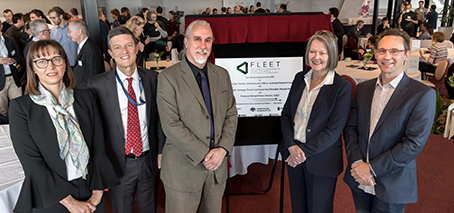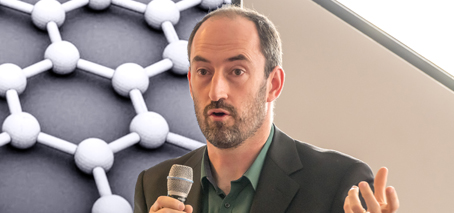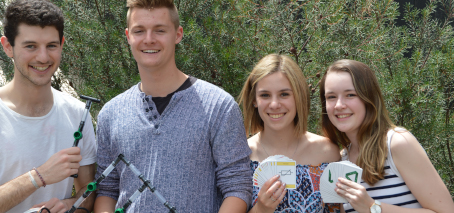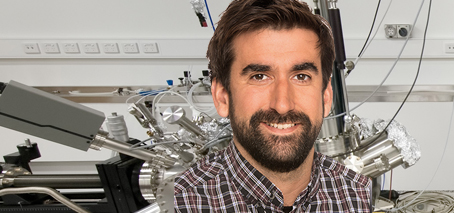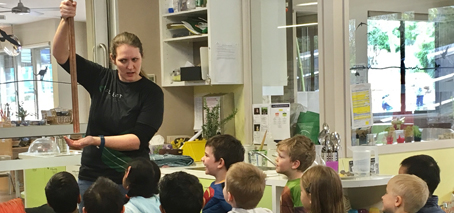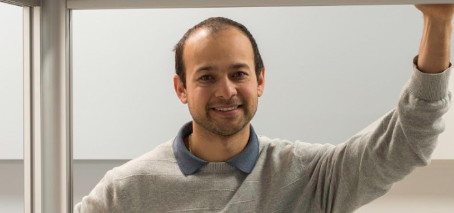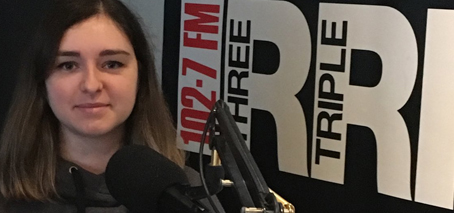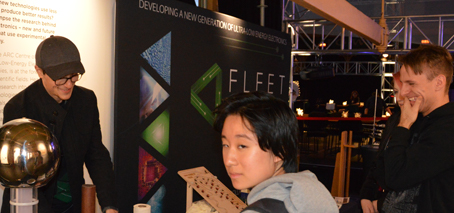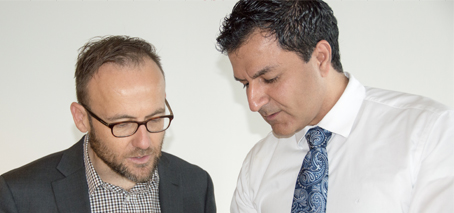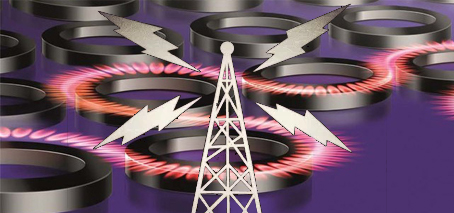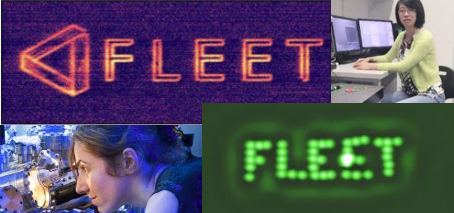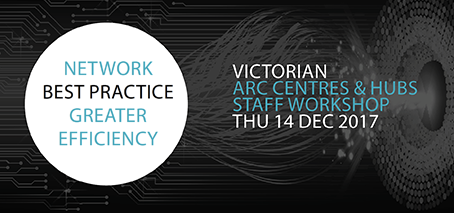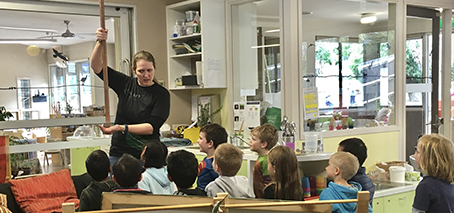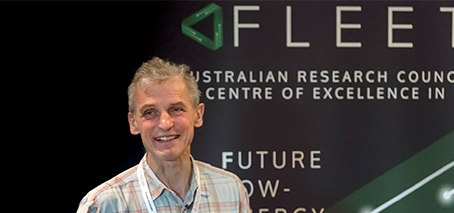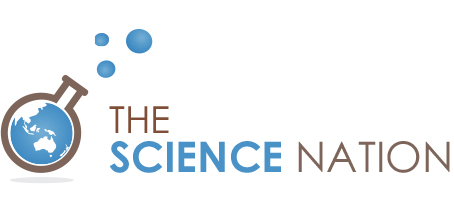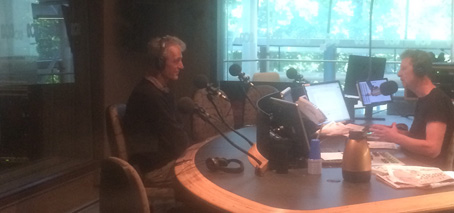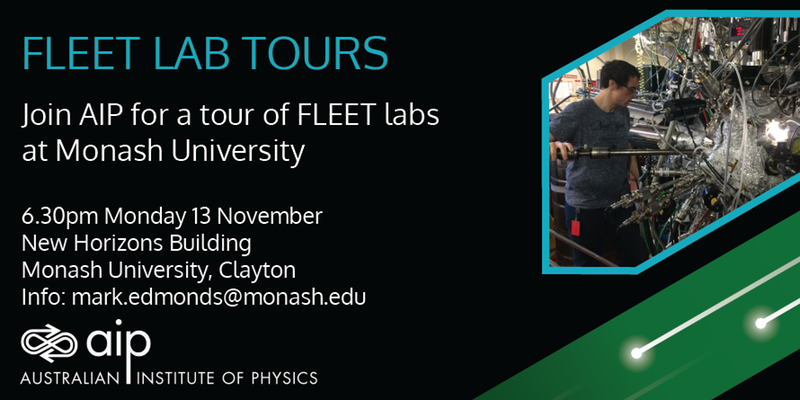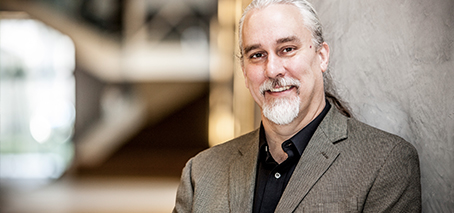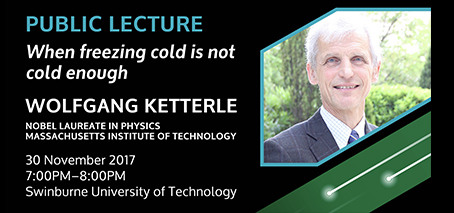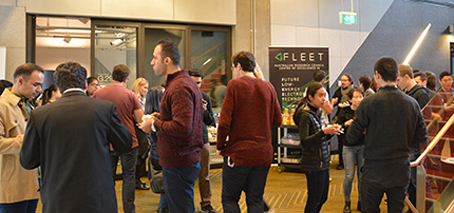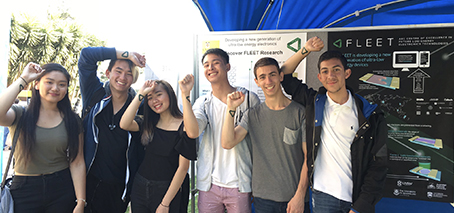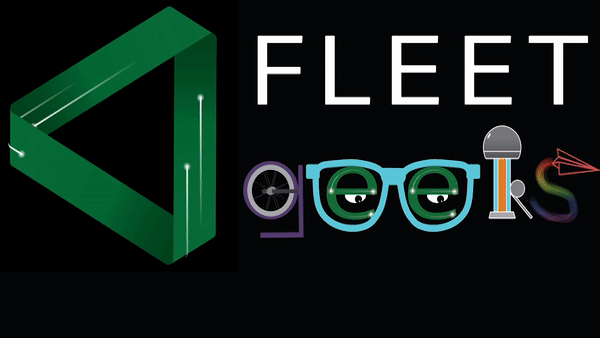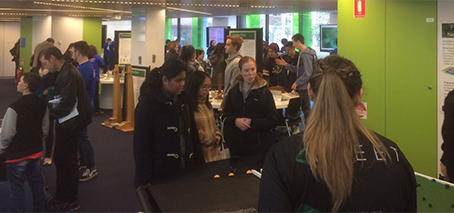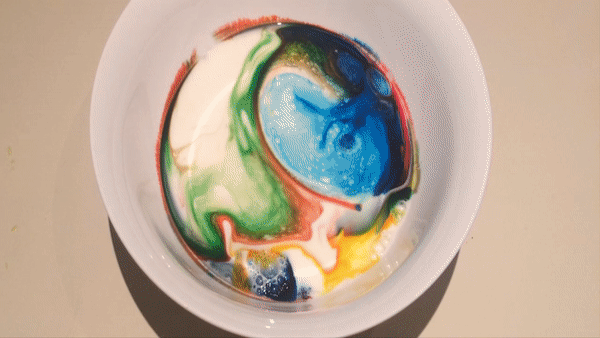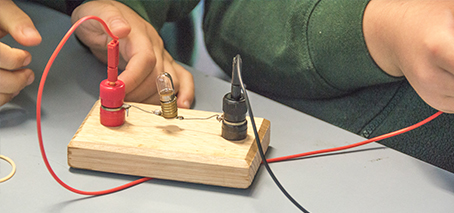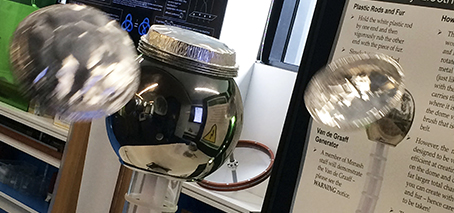A mini-symposium on ultrafast laser spectroscopy last week brought together the ultrafast laser spectroscopy community in Australia and New Zealand, showcasing local ultrafast laser spectroscopy research and capabilities. Exciton Science and FLEET co-sponsored the Ultrafast Laser Spectroscopy Mini-Symposium at Swinburne, which saw 45 researchers attending from 12 different unis/orgs. At FLEET, ultrafast spectroscopy is used to help understand the microscopic …
Unconscious bias unplugged
FLEET members at the 2019 annual workshop spent time looking into their own unconscious bias, with a view to better identifying and heading off this in-built, prevalent bias. To help FLEET become more aware of unconscious bias and other barriers to cultural and gender diversity, every FLEET member must attend at least one training workshop or training session in Equity, …
New partnerships with STEM equity change agents: MAGIC and DCA
Two significant, long-term partnerships will progress FLEET’s equity goals as well as supporting change in the Australian STEM community. FLEET was pleased to be a sponsor for this year’s annual MAGIC mentoring workshop, which provides mentoring and skills development for early-career female and gender-diverse researchers in maths and physical science. FLEET’s three-year partnership with Mentoring and Guidance in Careers (MAGIC) …
Establishing a collaborative culture across FLEET in 2019
First research workshop organised by early-career researchers (ECRs) and students Cross-node publications increased by 18% (from 7 to 11 ) Four FLEET-wide, live-streamed seminars run in 2019 (target 10) New $50,000 grant created for collaborative projects with partner MacDiarmid Institute New $20,000 funding pool established for ECR collaborative grants with partner organisations Christmas in July social event, Melbourne nodes 30 …
Extending FLEET’s engagement with school students
In 2019, FLEET cemented its relationship with Monash Tech School continuing to be involved as the school ramped up its activity. FLEET’s fruitful partnership with Monash Tech School features lab tours that provide hands-on science experiences for participating secondary students. From May to December, FLEET provided lab tours and activities on an almost weekly basis for Year 8 students from …
Collaborating 2019
FLEET continues to build links with other science organisations within Australia to further the reach of science, advance equity issues and develop future leaders, for example: Sponsoring childcare at the annual Science Meets Parliament, with Science and Technology Australia (STA) Running pitch training with two other ARC Centres of Excellence Co-sponsoring Physics in the Pub with three ARC Centres of …
Three of FLEET’s future science leaders engaging with policy-makers
FLEET had a team of three researchers at Science meets Parliament (SMP) in November, talking to parliamentarians and other scientists from around the country, and perfecting the art of pitching to politicians. FLEET’s gun team were: Hareem Khan (RMIT), Oliver Stockdale (UQ) and Semonti Bhattacharyya (Monash). Science Meets Parliament is an annual meeting of Australia’s policy-makers with leading and emerging …
Gordon Godfrey Workshop advances Australian quantum physics
Almost 120 researchers gathered in UNSW last week to discuss spin and strong-electron correlations in the university’s biennial Gordon Godfrey Workshop. The 2019 Gordon Godfrey Workshop on Spins and Strong Correlations was held at UNSW’s School of Physics for five days from 25 to 29 November. The Gordon Godfrey Workshops, which have been running since 1991, provide a forum for Australian and international researchers to exchange ideas and …
Developing future scientific leaders
FLEET tops up external funding to build leadership skills Two of FLEET’s six strategic priorities are developing the next generation of science leaders, and fostering equity and diversity in STEM. Establishing career support initiatives for women in FLEET is an important milestone towards achieving each of these goals. FLEET will provide an environment for our early-career women to thrive and …
Discussing future science with future scientists (Queensland)
FLEET’s Matt Davis (node leader University of Queensland) discussed the future of science with some of Australia’s future scientists this month at Ipswich State High School, with local MP Shayne Neumann and James Rasmussen of Origin Energy.
Future electronics and theoretical physics: Sam Bladwell interviewed
FLEET’s Sam Bladwell (UNSW) was recently interviewed by Ian Woolf on Diffusion Radio, discussing the ICT energy issue that drives FLEET’s research as well as his own theoretical studies into spin. Listen to: Future low-energy electronics Battling jetlag, Sam describes spintronics and the need for low-energy electronics (from 6:35min) Spins and valleys Sam describes how his theoretical studies dovetail with …
FLEET/UNSW scientists sharing their passion for science: Science outreach in August
—by Cecilia Bloise, Node Coordinator, UNSW There’s nothing like a strong dosage of outreach to get the ‘cats out of the box’ into the public sphere. The FLEET Centre of Excellence invests significant resources into science-outreach, aimed to inspire stronger engagement with science across all levels of the community, from primary and secondary school students to the broader population. Beyond …
Introducing future electronics at secondary-school level
FLEET is currently helping to run a Year 10 ‘Future electronics’ course in partnership with John Monash Science School, Victoria. As well as covering the history of semiconductors and computing, and introducing students to Moore’s Law, the course will also be most students’ first introduction to quantum science, and will be Australia’s first introduction to superfluids and topological materials at …
Lindau report
Three FLEET ECRs were fortunate to attend the 69th Nobel laureate meeting in Lindau, Germany, forming an impressive 30% of Australia’s ten-person delegation elected and led by the Australian Academy of Science. This year’s meeting focused on physics, and a number of senior FLEET were amongst the laureates. Our ECRs were pleased to connect with Wolfgang Ketterle, William Phillips, and …
Congratulations: Dianne Ruka, exceptional service award
Congratulations to FLEET’s outreach officer Dr Dianne Ruka, winning the Award for Exceptional Service to the Faculty of Science at Monash University. Dianne leads the education and training missions for FLEET across all seven collaborating universities, supporting staff and students across both Monash’s Science and Engineering Faculties, through science outreach programs. Since joining FLEET in 2017, Dianne has combined her …
COEs partner up for pitch training and physics on-stage
Three events last week allowed FLEET members to develop valuable, transferable communications and outreach skills, as well as providing a chance for FLEET to strengthen links with other ARC Centres of Excellence. A pitch training session for researchers from three ARC Centres introduced key communications concepts such as choosing the most effective lead, tailoring the pitch to the audience, presenting …
Flying the future-computing flag at Melbourne Knowledge Week
Over a dozen FLEET researchers flew the flag for FLEET and future computing at the recent Melbourne Knowledge Week showcase. Reps introduced the public to ICT energy use, electromagnetism, superconductivity (via FLEET’s supercooled Mobius track) , and the mechanics of binary operations that underlie all modern computing, via the Centre’s two Digicomputers. The superconducting track and Mobius track proved the …
Topological physics finds Famelab success
Congratulations to FLEET’s Sam Bladwell (right, UNSW), who won the NSW semifinal of Famelab, talking about study of electron spin, and will now compete in the finals in Perth on May 8th. Topological physics has done particularly well in this year’s Famelab, with FLEET associates Dr Semonti Bhattacharyya and Dr Antonija Grubisic-Cabo (Monash University) also qualifying for the Victorian semifinals. …
Three young FLEET scientists off to Lindau Nobel meeting
Three FLEET researchers have been chosen to represent Australia at the annual Lindau Nobel Laureate Meeting this year. The three FLEET researchers will among ten early-career Australian scientists attending the 69th Meeting of Nobel Laureates in Lindau, Germany, 30 June – 5 July 2019. The 69th Lindau Nobel Laureate Meeting will be dedicated to physics. To date, 42 Nobel Laureates have …
Networking and skills development: Canberra Summer School
Recognising the increasing importance of topological physics, FLEET helped run the 2018 Canberra International Physics Summer School on Topological Matter at ANU – a great opportunity for early-career Australian physicists to hear from leading experts from around the world. Over 90 attendees discovered topological materials’ applications to photonics, ultra-cold systems and quantum computation. Nobel laureate Prof Duncan Haldane (Princeton University) …
Pitch perfect: 2018 Idea Factory
In 2018, FLEET began an ongoing partnership with the ARC Centre for Engineered Quantum Systems (EQUS) to run a yearly ECR workshop building skills in communication, methods for pitching and presenting science, and working collaboratively with others. In between the teams’ pitch preparation and delivery, formal training sessions included science communication, oral presentations and how to craft an engaging research …
Learning to tell their science story: ECR comms training
Communications workshop for early-career researchers and PhD students Success in science requires the ability to describe one’s research in a coherent and compelling manner. FLEET has made an early start in building these skills in ECRs, with a half-day training session targeting science communications skills. A professional external facilitator from consultancy Mind Your Way coached young researchers on the particular …
Live-streamed FLEET seminars
In 2018 FLEET began a series of live-streamed seminars to help share research results across the Centre, keep members informed on latest FLEET research, and enhance inter-node collaboration. Early-career researchers presenting the seminars gain valuable presentation experience, and benefit from feedback on their research from diverse Centre members. These seminars also provide an opportunity for regular get-togethers in each node, …
Schools outreach in 2018
Over the course of 2018, 16 FLEET members visited or hosted 22 schools, engaging students with relevant issues such as information and technology (ICT) energy use, how transistors work and the new fields of science studied at FLEET. Our visiting scientists were kitted out with an outreach toolkit developed in-house, including mechanical digicomputers to demonstrate binary operations, two-dimensional (2D) material …
Engaging with policymakers in 2018
Education Minister Simon Birmingham and ARC CEO Sue Thomas visited FLEET labs in may this year at the University of Wollongong’s (UOW’s) Innovation Campus. UOW node leader Prof Xiaolin Wang, Centre Deputy Director Prof Alex Hamilton (UNSW) and UOW researchers gave the Minister a quick introduction to ICT energy-use issues, topological insulators and atomically-thin materials, including a tour of labs …
FLEET’s first annual workshop: member engagement
Forging a Centre that is greater than the sum of its parts FLEET’s inaugural annual workshop in Torquay, Victoria, represented the Centre’s first chance to cement relationships between geographically-isolated research nodes and diverse physics disciplines. With a focus on education, each day began with a tutorial laying out the fundamentals for one of three research themes. This introduction maximised the …
Building a cohesive Centre: 2018 annual workshop
Forging a Centre that is greater than the sum of its parts FLEET’s second annual workshop built on the successes of the 2017 workshop, bringing all of the Centre’s members and many international partners together in Magenta, mid-coast New South Wales. As in 2017, the workshop was family friendly, with partners and family made welcome at shared meals, social events …
Topological insulators are like a block of chocolates
Electrically, topological insulators resemble a chocolate block wrapped in foil: electrically insulating on the inside (the chocolate), but electrically conductive around the edges (the foil). It’s a very useful analogy to describe a new type of material, but we decided to test whether it’s actually correct. We tested four bars of chocolate, measuring the electrical resistance of the surrounding foil, …
Physicists tour FLEET-RMIT
FLEET’s RMIT labs recently hosted a tour by members of the Victorian branch of the Australian Institute of Physics, the country’s leading body for physics advocacy and support. The tour included the experimental laboratories and a briefing by RMIT node leader Prof Lan Wang, and AI Torben Daeneke, covering the research topics in Lan Wang’s group, Jared Cole’s group, JianZhen …
YouRforum UNSW
Where can your PhD take you? And how can you maximise your potential future? Because most PhD graduates will not end up in academia, FLEET assists HDRs in developing a diverse skills base to maximise future career opportunities. In 2018, FLEET’s YouRforum (Young Researchers Forum) was expanded to UNSW, where a panel of science PhDs discussed career options for STEM …
Supercool, superconducting Mobius track helps communicate FLEET science
A super-cooled, superconducting Mobius-track impresses the crowds, helps embed FLEET science As a cool science demo, FLEET’s superconductor Mobius track ticks all the boxes: liquid nitrogen – tick. Superconductor – tick. Cool shape – tick. Relevance to the science – tick tick tick. The track features 1500 neodymium magnets, fixed into the shape of a Mobius strip, so that a …
More than just great science: Matt Davis at the Centre Launch
FLEET will deliver much more than excellent science for Australian society. We are training some of the next generation of scientists, engineers, and entrepreneurs. We will help them develop not only technical research skills, but also transferable skills that will be useful to them no matter what their eventual career direction. For example, we have ensured that our research groups …
FLEET’s challenge and legacy
The challenge of finding a sustainable path to continuing the IT revolution is critical, and time is running out. I can tell you today with reasonable certainty that Moore’s Law will be declared dead within the seven-year operation of the Centre–perhaps even before our mid-term review! Computer chips will cease to gain in efficiency, and yet our demand for computation …
The case for FLEET: 8% of global electricity now consumed by computing
The information technology revolution has improved our lives, and we want it to continue. For example, our smartphone has become one of the most important devices of our everyday life: we use it to access up-to-date weather predictions, to plot the best route through traffic, and to watch the new series of House of Cards. And we expect it be …
Launching low energy electronics: FLEET Launch 12 June
Our insatiable appetite for computing means ITC already consumes 5–8% of global electricity, and is doubling each decade. Unless that ever-growing demand for computing can continue to be met with efficiency gains, the information revolution will slow down from power hunger. At the launch of a new Australian Research Council Centre of Excellence the audience heard that efficiency gains in current, …
Launch of FLEET Centre of Excellence to tackle hidden energy costs of computing
Official launch: Australian Research Council Centre of Excellence in Future Low-Energy Electronics Technologies 12 June 2018, 11 AM New Horizons Building, Monash University, Clayton We have an insatiable appetite for computing. But our ongoing need for computation is burning more than 5 percent of global electricity. And that figure is expected to double each decade. A new Australian Research Council …
The innovative science behind FLEET: Jared Cole at the Centre Launch
When using an electronic device to watch tv, listen to music, model the weather or any other task that requires information to be processes, there are millions and millions of binary calculations going on in the background. There are zeros and ones being flipped, added, multiplied and divided at incredible speeds. The fact that a microprocessor can perform these calculations …
Macro-chips and electronic card games: challenging students
Fresh minds develop hands-on learning methods for schools FLEET is developing innovative ways to communicate physics to school students. A collaboration with Monash University Science allowed the Centre to enlist fresh brains to this communications challenge. A team of maths and physics students from Monash Bachelor of Science–Global Challenges took on the task of developing hands-on games and resources to demonstrate …
Agustin describes atomic-scale materials engineering on RRR
FLEET Chief Investigator Agustin Schiffrin spoke on science show Einstein a Go-Go about experimental physics at the atomic scale, and the study of exciting new nanomaterials with tailored electronic properties. Listen Agustin researches new nanomaterials with novel and exotic electronic properties, constructed of organic (carbon-based) molecules, sometimes inspired by bio-organisms. The team studies topological materials, which display a range of fascinating, …
Sharing a passion for science: outreach to schools
FLEET shares the responsibility to support students and teachers to increase participation in science, and in particular works towards increasing the number of girls and women participating in physics, chemistry and engineering. The Centre Launch on 12 June will showcase FLEET’s science outreach programs, educating the public and inspiring a new generation of scientists. Home Science and FLEET Geeks programs …
Carlos talks ultra-cold atoms and inspiring schoolkids to do science, RRR
FLEET postdoc Dr Carlos Kuhn described his field of ultra-cold atomic science and the fundamental discoveries made in an interview with RRR science show Einstein a Go-Go. The research will take a huge step forward this year with the commissioning of a new ARC-funded quantum-gas microscope, which will bridge the microscopic (atomic) and macroscopic (visible) worlds. Carlos also described his …
Rebecca Orrell-Trigg (RMIT) interview re liquid metal and 2D materials, RRR
FLEET PhD student Rebecca Orrell-Trigg (RMIT) uses liquid metals to synthesise 2D (atomically thin) materials for use in future ultra-low energy electronic devices. Late last year they developed a liquid metal “bubbling” method that was described as “ground breaking”, and have since refined this method to make it even more widely applicable. Rebecca’s interview covered the advantages of the new …
Building members’ outreach skills: 2018 Melbourne Knowledge Week
Melbourne Knowledge Week (May 2018) was an opportunity for FLEET to engage with the public and road-test a number of outreach demonstrations being developed for schools. It also gave 20 Centre members the opportunity to gain valuable experience in public science outreach, speaking to a diverse audience. Melbourne Knowledge Week showcases cool science and engineering projects in the city of …
Melbourne MP Adam Bandt visiting FLEET RMIT
An MP visit last week provided an opportunity to discuss future electronics, 2D materials and science policy. Melbourne MP and Greens Science/Energy spokesperson Adam Bandt was visiting FLEET’s labs at RMIT, hosted by FLEET RMIT node leader Kourosh Kalantar-Zadeh, and FLEET Director Michael Fuhrer. As well as FLEET researchers, Adam also got to meet our scientific counterparts from the Centre for …
Torben talks liquid metal with Subatomic, Radio Adelaide
“It’s so simple my retired parents could do this in their kitchen.” FLEET AI Torben Daeneke discussed deceptively-simple methods of depositing atomically-thin materials with Rohan Neagle, on Radio Adelaide’s Subatomic radio show. Torben’s interview also covered why 2D materials are key to ultra-low energy electronics, the mechanics of 2D deposition, the end of Moore’s Law and the massive amount of …
Micro branding: creating microscale and nanoscale FLEET banners
FLEET researchers taking an innovative, even ‘playful’, approach to their science have created a couple of unique and interesting branding displays for the Centre. >>>FLEET PhD student Fan Ji developed this micro-sized logo (right) at UNSW. The FLEET logo is etched onto the two-dimensional interface between two materials, in letters only a few thousandths of a millimetre high, using bias-assisted …
Michael Fuhrer talks more-accessible physics and better transistors on radio 2CC
FLEET Director Michael Fuhrer spoke Friday with ABC Radio 2CC Canberra’s Rod Henshaw about making physics more accessible, and FLEET’s search for better, ultra-low-energy transistors. Listen Prof Fuhrer was in Canberra for the International Physics Summer School on Topological Matter at ANU. Fuhrer discussed energy use in information and communications technology (ICT) and the alternatives that FLEET is pursuing, …
Communications Training: When a Picture is Worth 1000 Words
Lyndal Byford of the Australian Science Media Centre presented to HDR students and early career researchers at Monash University on communication. She presented on the value of video and how to use a mobile phone to create quality video that can be used by media. You can find a pdf of the slides here. For the full presentation, including videos, …
Research centres share best practice
Sharing best practice, finding efficiencies, setting up future networks – and swapping a few war stories Operations staff from 18 ARC-funded centres met in Melbourne last week to share best practice and learnings, and to develop future networks among similar roles. How do centres become ‘greater than the sum of the parts’? What strategies have professional staff found to enhance …
Launching FLEET Geeks: taking science to schools
Reaching schoolkids, and setting scientists up for outreach success Bringing practising scientists to schools brings enormous benefits. The FLEET Geeks program sees FLEET members performing science shows at primary schools and kindergartens, demonstrating physics with equipment not typically available to students. The program brings scientists to the students, allowing them to ask questions about scientific phenomena seen in the show, …
Ultracold science and benefits of a changeable career in science: Wolfgang Ketterle
Physics experiments at temperatures a billionth of outer space, and the benefits of flexibility in a science career. Nobel physics laureate Prof Wolfgang Ketterle told a crowd of around 200 at Swinburne University of Technology last week about Bose-Einstein condensates (BECs), and other strange states of matter that exist at nano-Kelvin temperatures, which open a new door to the quantum …
Science Says! and other outreach collaborations
FLEET supported the first Melbourne show of Science Says!, a science entertainment event run by The Science Nation, with FLEET’s A/Prof Meera Parish (Monash University) and Prof Chris Vale (Swinburne University of Technology) appearing on the panel at the Royal Society of Victoria. FLEET collaborated with Swinburne University of Technology, Monash University School of Physics and Astronomy, and the Australian …
Wolfgang Ketterle introduces Red to new states: ABC Radio Melbourne
“That’s not right!” Well, yes, it is. Prof Wolfgang Ketterle, in Australia with FLEET, teaches ABC Radio Melbourne’s Red Symons a thing or two about states of matter. In particular, Bose Einstein condensates. Listen below. Ketterle, in town for FLEET’s inaugural annual workshop in Torquay, is visiting the ultra-cold atomic labs at Swinburne today, where FLEET researchers use Bose-Einstein condensates …
FLEET hosts physicists tour at Monash
FLEET’s Monash labs recently hosted a tour by members of the Victorian branch of the Australian Institute of Physics, the country’s leading body for physics advocacy and support. The tour included the experimental laboratories of FLEET Chief Investigators Michael Fuhrer, Agustin Schiffrin, Kris Helmerson and Qiaoliang Bao. Members saw where: Michael Fuhrer grows atomically-thin (2D) materials in the lab using …
Michael Fuhrer’s STEM Talk
As part of National Science Week 2017, Prof. Michael Fuhrer participated in STEM Talks, organised by the Faculty of Education at Monash University, where he discussed his research on topological insulators, which won the 2016 Nobel Prize for Physics. The full talk (see the link below) covers the energy used in computation, now around 5% of global electricity, as well …
When freezing cold isn’t cold enough, and lunch with a laureate
Public talk 30 November All are welcome to a public talk at Swinburne University of Technology (Hawthorn) at 7PM on Thursday 30 November. Prof Ketterle will discuss Bose-Einstein condensates, in which atoms are cooled to temperatures a billion times colder than outer space, and matter behaves as a wave, “marching in quantum lockstep”. These forms of ultra-low temperature matter, …
Got a PhD? What’s next?
Where can your PhD take you? And how can you maximise your potential future? A group of STEM PhDs and higher degree researchers heard about career options post-PhD at a forum last month, run by FLEET at Monash University. The assembled panel of academics, entrepreneurs, business development and research managers shared their own diverse career journeys and top tips on …
UNSW presents FLEET
The University of New South Wales has presented FLEET to the public as part of their Open Day. Sydney turned on some beautiful weather, as FLEET staff and students explained topological insulators to prospective students and their families, and demonstrated the isolation of atomically thin materials using graphite and molybdenum disulfide.
National Science Week – FLEET Physics Show
As part of National Science Week, FLEET’s Education & Training Coordinator visited a local kindergarten and primary school to perform a FLEET Geeks Physics Show. Dr. Dianne Ruka wowed the students, demonstrating a variety of physics concepts, including motion, forces, angular momentum and static electricity. Many of these demonstrations were performed as ‘magic tricks’, though Dianne explained that magic is …
Michael Fuhrer talks low-energy electronics on Radio 3RRR
FLEET Director Michael Fuhrer spoke today with science show Einstein a gogo on 3RRR about energy use in information and communications technology (ICT), limits to our ability to squeeze more efficiency out of traditional silicon-based technologies, and the alternatives that FLEET is pursuing, including topological materials and atomically-thin materials. Listen
FLEET Geeks
National Science Week is almost here and the team from FLEET will be visiting some local schools to put on a physics show. Students will be treated to a range of different physics activities and will have the opportunity to participate and learn more about the unseen forces all around them.
Monash Open Day introduces FLEET to students and public
Monash University’s recent open day provided a great opportunity to explain FLEET to a large audience. The FLEET zone in the School of Physics and Astronomy area allowed for hands-on demonstrations, while lab tours provided a closer look at the research and FLEET director Michael Fuhrer presented a talk on the big picture challenges of energy use in global computing. …
Launching home science activities
FLEET aims to make science more accessible to the wider community, and to bring science to kids who will become Australia’s future great scientists and engineers. So today, we’re launching a new program of home science activities for kids. FLEET will provide ideas for fun science activities and experiments that are easy to do in the home. Our first three …
FLEET school visit examines electricity and electrons
FLEET’s Senior Education & Training Coordinator visited a primary school to speak to Grade 2 students about electricity and electrons. Students were challenged to make a light bulb light up using a battery and some wires, and to find materials that could act as conductors. The students have been studying about materials and technology this term, so the topics fit …
FLEET Director on National Science Quiz panel
The National Science Quiz will be held in Melbourne on Sunday 18 June at 3pm. FLEET Director, Professor Michael Fuhrer, will be one of the scientists on the panel for this event. With live demonstrations and curiosity-provoking questions, the National Science Quiz is ninety minutes of science, maths, and laughs that promises fun for the whole family. #NatSciQuiz2017 Secure your …
First FLEET school visit next week
FLEET staff will be visiting a primary school next week to talk to Grade 2 students about energy, electricity and technology. With the use of a van de Graaff generator, it’ll be a hair-raising experience! FLEET has a commitment to bringing science and research to the wider community. FLEET staff are currently developing a range of resources that can be …
- Page 2 of 2
- 1
- 2

